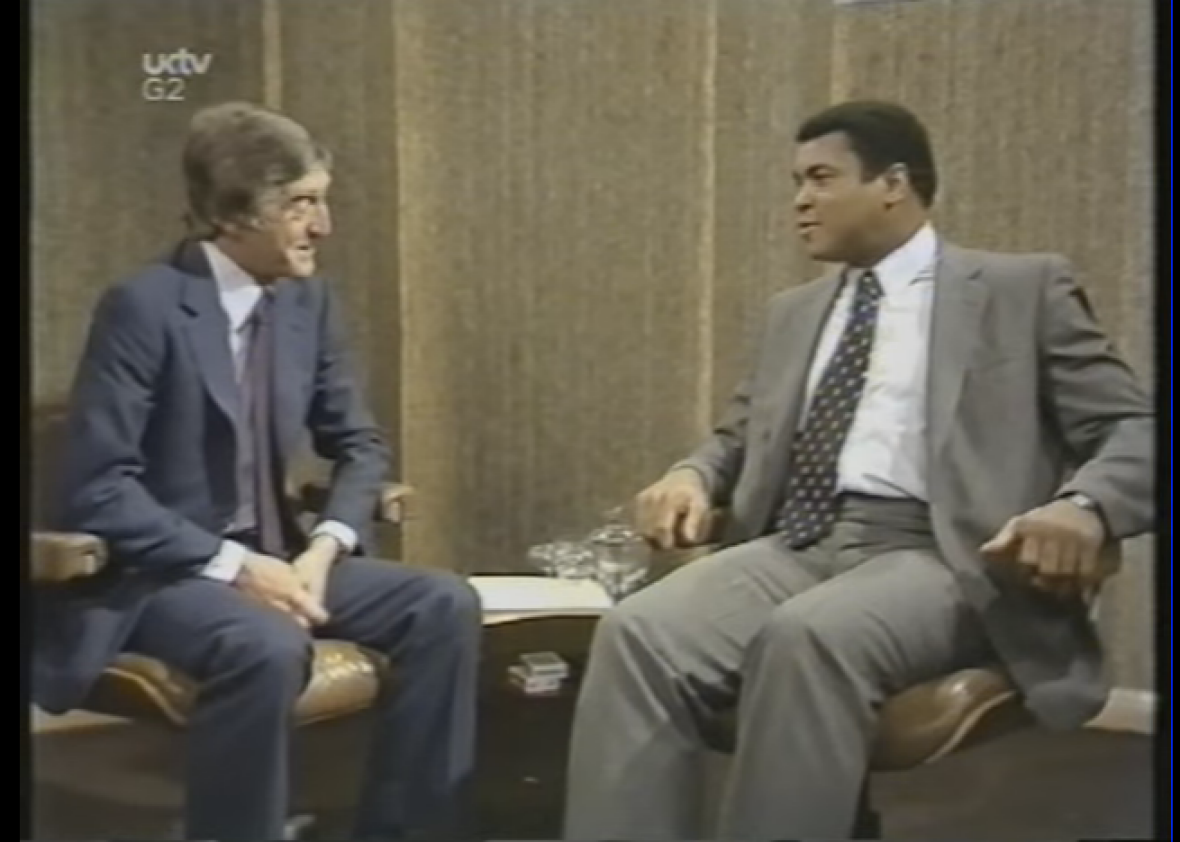Muhammad Ali may have been the greatest fighter who ever lived, but some of his best sparring actually occurred outside of the ring. Ali, who died at the age of 74 on Friday, was a legendary wit who could go toe to toe with most anyone in a battle of words. Perhaps the verbal sparring partner who got the best out of him most often, though, was the British talk show host Michael Parkinson.
The former BBC presenter, who once called Ali “the most remarkable man I ever met,” faced off with the champ four times in the 1970s and 1981. Most of these interviews are available online, and they are gems. So much so, in fact, that Ali reportedly spent significant time in the last few months of his life watching the sessions on YouTube.
In March, Britain’s Daily Mirror reported that watching old clips of himself on YouTube, including those BBC interviews, was “the thing he loves most,” according to his wife Lonnie Ali.
When asked how the 74-year-old copes with the Parkinson’s disease he was diagnosed with in 1984 Lonnie said: “He watches the Parkinson interviews.”
The interviews are indeed entrancing. The first session occurred in 1971 and is difficult to find on YouTube because of apparent copyright issues, but you can watch it in its entirety here. Like all of these interviews, Ali is cracking jokes and making the audience laugh throughout. But as with the other interviews he also addressed in thoughtful and straightforward terms racism and other serious issues.
In a 1974 interview, again Ali teases Parkinson mercilessly and hilariously. But in one of these encounters, the host challenges the champ on the issue of his black separatism, which he would later abandon. Ali goes on a lengthy rant defending his views, along the way reciting a poem he wrote about friendship, speaking in semantic circles about the difference between a white friend and a white acquaintance, and talking for minutes straight seemingly breathlessly. He seems hyperdefensive but puts on a fantastic display of his legendary braggadocio. “You do not have enough wisdom to corner me on television,” Ali boasts wryly. “You do not have enough. You are too small mentally to tackle me on nothing that I represent.”
“Must have been a good question I asked you because you’ve been talking for about 15 minutes,” Parkinson responds.
“I’ll talk for 20 more,” Ali retorts. (You can watch all of this in part three below.)
Finally, Parkinson interviewed Ali one last time in 1981 and the episode is full of the typical verve the men shared. “You believe me don’t you,” Ali says to Parkinson after a typically cheeky comment. “I believe anything you tell me. I always have done,” Parkinson says to the champ. “You’re smart,” Ali replies.
This final episode is full of candor and sweetness and apparent affection, but one particularly prophetic and sad moment comes at the six-minute mark in the clip below.
Parkinson essentially asks Ali why he is continuing to fight when he is clearly past the ability where it is any kind of safe to do so. This question comes just a few months after Ali took a horrific 10-round beating at the hands of Larry Holmes that is said to have contributed to Ali’s development of Parkinson’s disease. “You’ve seen what can happen to fighters. You’ve seen those shambling wrecks that come around. You’ve seen them at every boxing occasion and what people are frightened of is that they don’t want that to happen to you,” Parkinson exhorts. He says he and fans are raising these questions because of “the affection they have for you. They’ve never felt about another boxer like they’ve felt about you.”
Ali responds to these appeals with typical humor and gentleness but also boasts only half-kiddingly about his wisdom and intellect. His thought processes, he argues, are guided by opportunities that those who are questioning his choices never had and can’t possibly fathom. He says that his mental faculties are all still there. Ali then goes in for the coup de grace, as he’d done in previous appearances.
“Take this interview as an example. Look how we’re talking and how I’m handling you. You are a wise man and [other] boxers can’t do this [sparring with you],” Ali says. “This is knowledge and wisdom, this is brains, look how we’re talking. This looks like my show.”
Ali would go on to fight one more bout, losing another 10-round decision later that year and taking another pounding. Less than three years later he was diagnosed with Parkinson’s.*
Even after his diagnosis, Ali was still an excellent interview subject, tossing consistently funny quips at questioners wherever he faced them. But he would never be the same in his later years as he was during those contests with the BBC broadcaster. Parkinson summarized their meetings perfectly: “I interviewed him four times. I lost on every occasion.”
Read more in Slate about Muhammad Ali:
- Muhammad Ali Has Died at 74. Here Is One of His Greatest Moments.
- The Time Muhammad Ali Stopped a Man from Leaping to His Death
- The Best Stories Ever Written About Muhammad Ali
*Correction, June 4, 2016, 12:31 p.m.: This post originally described Ali’s final fight as a 19-round loss.
